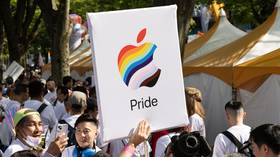Can Huawei's new OS make customers ditch Google’s Android?
Huawei is expected to drop more details about its homegrown Hongmeng operating system at an upcoming conference. But is the world ready to ditch Android for an untested Chinese alternative? And is Google worried?
A new Huawei phone equipped with the Hongmeng operating system, also known as the HarmonyOS, could go on sale before the end of the year, the state-linked Chinese newspaper Global Times reported on Sunday. According to the newspaper, the phone aims to target the low and medium ends of the smartphone market, setting the price tag at around 2,000 yuan (roughly US$290).
The phone is likely to make an appearance at Huawei’s annual developer conference, kicking off on Friday in Songshan Lake. Ahead of any bombshell information, how likely is the operating system to woo customers away from the ubiquitous Android?
Also on rt.com Huawei likely to replace Google’s Android with own mobile operating system this yearIt’s worth noting that Hongmeng was never Huawei’s priority. The Chinese company - currently the world’s second-largest smartphone manufacturer behind South Korea’s Samsung - was content to ship its devices with Google’s Android operating system, until political developments between Washington and Beijing threw that arrangement into jeopardy.
Amid a simmering trade war between the two countries, the Trump administration added Huawei to a trade blacklist in May, forbidding US firms from selling parts and components to the Chinese smartphone giant. The restrictions on buying from American firms were suspended a month later, but not before Huawei executive Richard Yu announced it would release its own “Plan B” operating system in response. CEO Ren Zhengfei also hinted that the OS had been in development for some time, as Huawei had been “preparing” for US persecution.
The choice between Android - which has 2.5 billion monthly active users worldwide - and a “Plan B” operating system might seem like an obvious one for consumers, but Yu insisted that Huawei’s OS will run Android apps, and may even improve their performance. According to a report from Global Times, Chinese manufacturers OPPO and VIVO - which clog up sites like GearBest and Aliexpress with budget handsets - tested the OS and reported it to be 60 percent faster than Android.
Also on rt.com Over 1k Android apps harvest your data even if denied permission – studyIf Huawei’s gamble pays off and the company ditches Android for good, Google could lose up to 800 million users, Zhengfei said last month. However, if the operating system proves a failure, Huawei could fall behind Samsung, Apple and the smattering of other Chinese makers that dominate the global smartphone leaderboards. Success for Huawei will likely rest on pushing out a functioning product, and convincing other Chinese manufacturers to adopt it.
While app availability will likely be users’ biggest concern, the choice between Hongmeng and Android will also come down to two key points: virus protection and battery life. Google Play Protect performs safety checks on any apps downloaded on Android devices. Without this protection, Google has reportedly warned that Huawei phones using Hongmeng, or an unsupported version of Android in the interim, would be “more at risk of being hacked, not least by China.”
Battery life issues have dogged Android devices as of late. Though bundled with some nifty battery-saving features, the latest iteration of the OS reportedly drains users’ batteries even faster than before. Here, Huawei could score a win. Originally developed for industrial and Internet-of-Things usage, Hongmeng contains fewer lines of code than any other phone OS, and could prove a miser on power.
However, that same threadbare nature has fuelled speculation as to whether Huawei would even bother using the OS for phones. In June, the company’s senior vice president Catherine Chen said that for this reason alone, Huawei would continue to work with Google if possible, a position contradicted by this week’s news.
Concrete answers are still thin on the ground, and until more is revealed at Friday’s conference, the threat to Google’s dominance is still all speculative.
Subscribe to RT newsletter to get stories the mainstream media won’t tell you.















